Contemporary Issues of Management Accounting: Climate Change
VerifiedAdded on 2021/04/21
|12
|2013
|95
Report
AI Summary
This report delves into the contemporary issues of management accounting, specifically focusing on the ramifications of climate change on various stakeholders. It begins with a literature review exploring voluntary carbon disclosure, stakeholder theory, and regulatory factors influencing carbon disclosure determinants. The report then constructs a conceptual model and formulates hypotheses to examine the relationship between stakeholder power, voluntary reduction targets, and responses to stakeholder pressure. It outlines proxy measures for theoretical constructs and details the research methodology, including the deductive research approach, data collection methods utilizing primary and secondary sources, sampling techniques, and data analysis procedures. The study aims to understand the complex interplay between climate change, stakeholder engagement, and the role of carbon disclosure in corporate decision-making, providing valuable insights into sustainable practices and environmental responsibility within organizations.
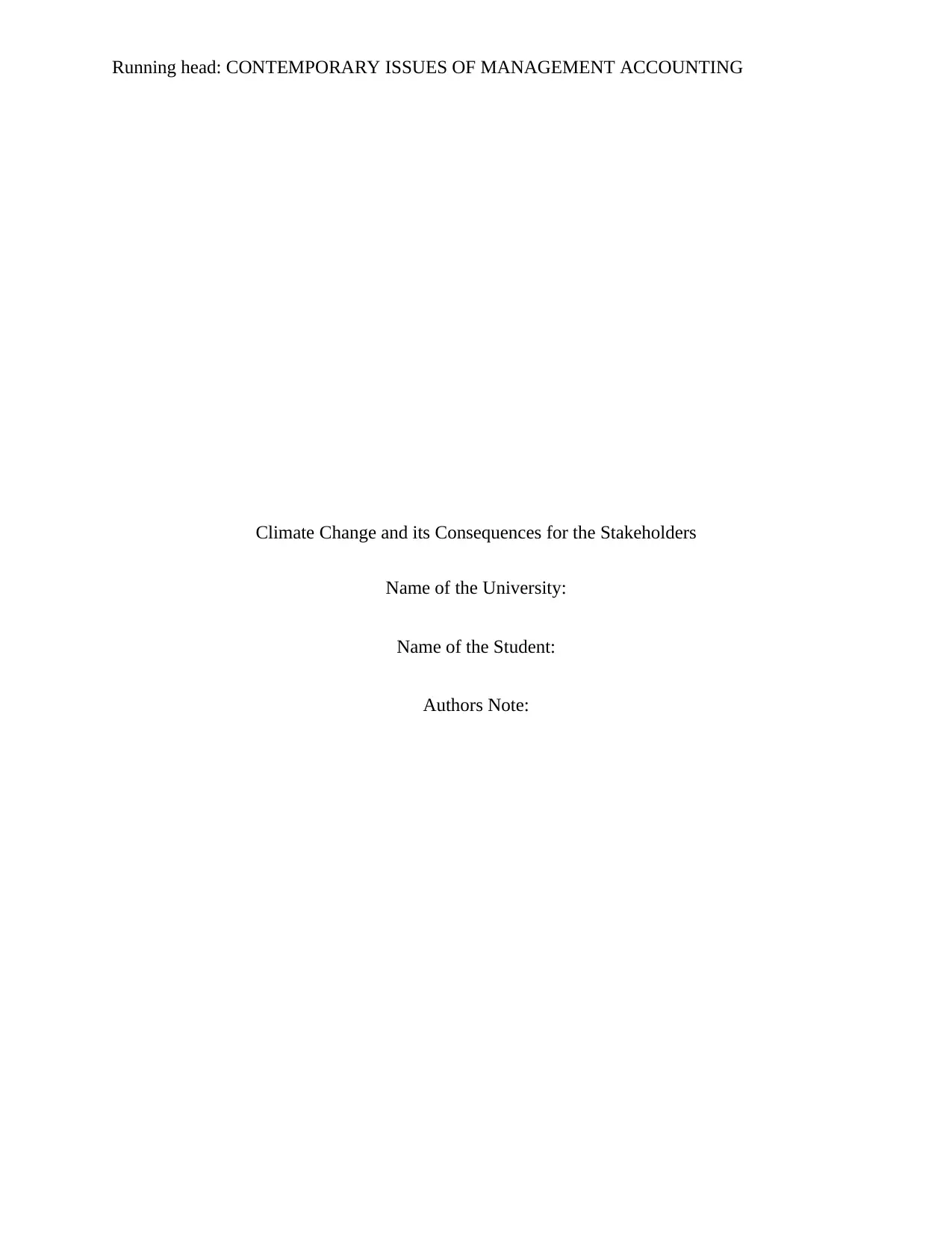
Running head: CONTEMPORARY ISSUES OF MANAGEMENT ACCOUNTING
Climate Change and its Consequences for the Stakeholders
Name of the University:
Name of the Student:
Authors Note:
Climate Change and its Consequences for the Stakeholders
Name of the University:
Name of the Student:
Authors Note:
Paraphrase This Document
Need a fresh take? Get an instant paraphrase of this document with our AI Paraphraser
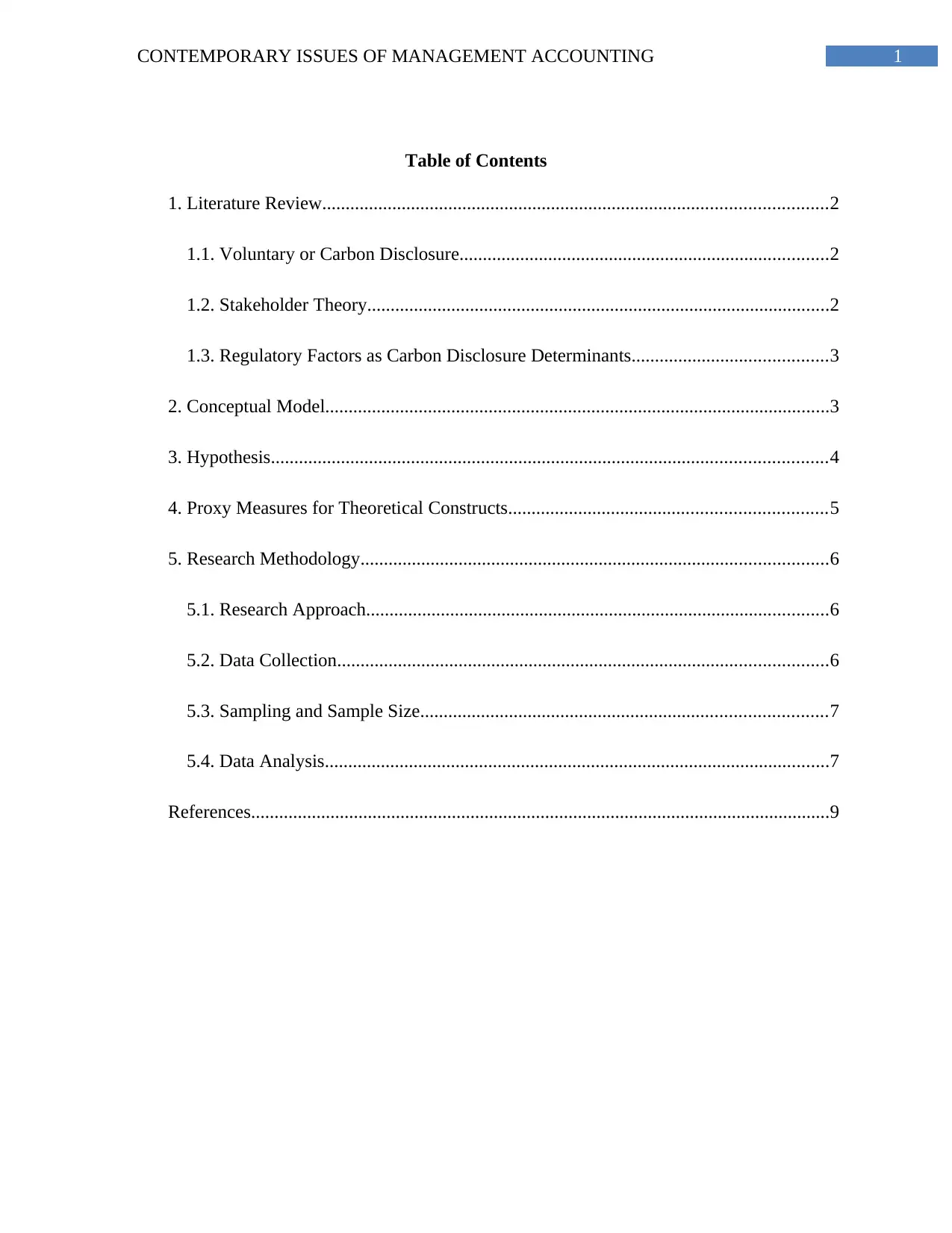
1CONTEMPORARY ISSUES OF MANAGEMENT ACCOUNTING
Table of Contents
1. Literature Review............................................................................................................2
1.1. Voluntary or Carbon Disclosure...............................................................................2
1.2. Stakeholder Theory...................................................................................................2
1.3. Regulatory Factors as Carbon Disclosure Determinants..........................................3
2. Conceptual Model............................................................................................................3
3. Hypothesis.......................................................................................................................4
4. Proxy Measures for Theoretical Constructs....................................................................5
5. Research Methodology....................................................................................................6
5.1. Research Approach...................................................................................................6
5.2. Data Collection.........................................................................................................6
5.3. Sampling and Sample Size.......................................................................................7
5.4. Data Analysis............................................................................................................7
References............................................................................................................................9
Table of Contents
1. Literature Review............................................................................................................2
1.1. Voluntary or Carbon Disclosure...............................................................................2
1.2. Stakeholder Theory...................................................................................................2
1.3. Regulatory Factors as Carbon Disclosure Determinants..........................................3
2. Conceptual Model............................................................................................................3
3. Hypothesis.......................................................................................................................4
4. Proxy Measures for Theoretical Constructs....................................................................5
5. Research Methodology....................................................................................................6
5.1. Research Approach...................................................................................................6
5.2. Data Collection.........................................................................................................6
5.3. Sampling and Sample Size.......................................................................................7
5.4. Data Analysis............................................................................................................7
References............................................................................................................................9
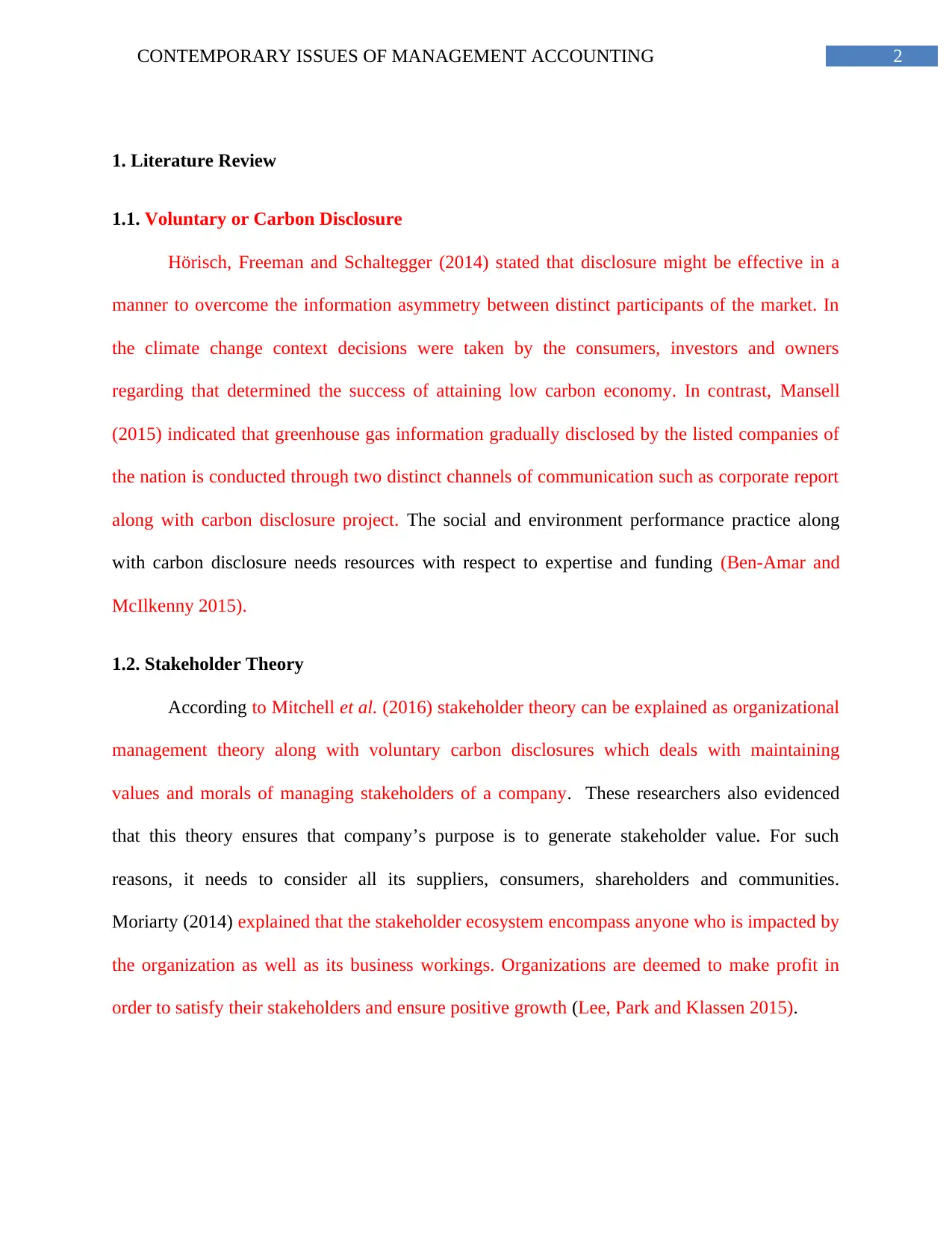
2CONTEMPORARY ISSUES OF MANAGEMENT ACCOUNTING
1. Literature Review
1.1. Voluntary or Carbon Disclosure
Hörisch, Freeman and Schaltegger (2014) stated that disclosure might be effective in a
manner to overcome the information asymmetry between distinct participants of the market. In
the climate change context decisions were taken by the consumers, investors and owners
regarding that determined the success of attaining low carbon economy. In contrast, Mansell
(2015) indicated that greenhouse gas information gradually disclosed by the listed companies of
the nation is conducted through two distinct channels of communication such as corporate report
along with carbon disclosure project. The social and environment performance practice along
with carbon disclosure needs resources with respect to expertise and funding (Ben‐Amar and
McIlkenny 2015).
1.2. Stakeholder Theory
According to Mitchell et al. (2016) stakeholder theory can be explained as organizational
management theory along with voluntary carbon disclosures which deals with maintaining
values and morals of managing stakeholders of a company. These researchers also evidenced
that this theory ensures that company’s purpose is to generate stakeholder value. For such
reasons, it needs to consider all its suppliers, consumers, shareholders and communities.
Moriarty (2014) explained that the stakeholder ecosystem encompass anyone who is impacted by
the organization as well as its business workings. Organizations are deemed to make profit in
order to satisfy their stakeholders and ensure positive growth (Lee, Park and Klassen 2015).
1. Literature Review
1.1. Voluntary or Carbon Disclosure
Hörisch, Freeman and Schaltegger (2014) stated that disclosure might be effective in a
manner to overcome the information asymmetry between distinct participants of the market. In
the climate change context decisions were taken by the consumers, investors and owners
regarding that determined the success of attaining low carbon economy. In contrast, Mansell
(2015) indicated that greenhouse gas information gradually disclosed by the listed companies of
the nation is conducted through two distinct channels of communication such as corporate report
along with carbon disclosure project. The social and environment performance practice along
with carbon disclosure needs resources with respect to expertise and funding (Ben‐Amar and
McIlkenny 2015).
1.2. Stakeholder Theory
According to Mitchell et al. (2016) stakeholder theory can be explained as organizational
management theory along with voluntary carbon disclosures which deals with maintaining
values and morals of managing stakeholders of a company. These researchers also evidenced
that this theory ensures that company’s purpose is to generate stakeholder value. For such
reasons, it needs to consider all its suppliers, consumers, shareholders and communities.
Moriarty (2014) explained that the stakeholder ecosystem encompass anyone who is impacted by
the organization as well as its business workings. Organizations are deemed to make profit in
order to satisfy their stakeholders and ensure positive growth (Lee, Park and Klassen 2015).
⊘ This is a preview!⊘
Do you want full access?
Subscribe today to unlock all pages.

Trusted by 1+ million students worldwide
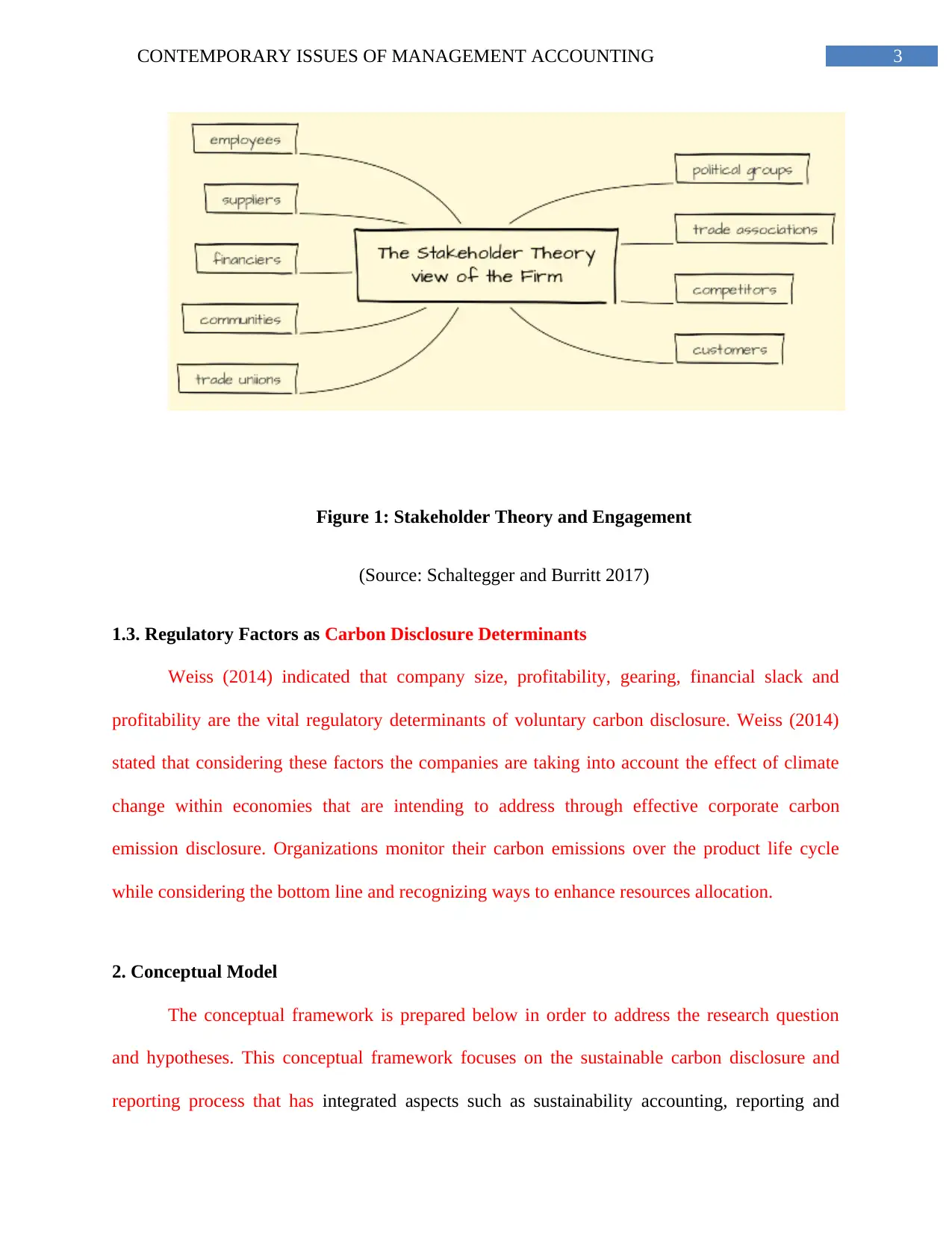
3CONTEMPORARY ISSUES OF MANAGEMENT ACCOUNTING
Figure 1: Stakeholder Theory and Engagement
(Source: Schaltegger and Burritt 2017)
1.3. Regulatory Factors as Carbon Disclosure Determinants
Weiss (2014) indicated that company size, profitability, gearing, financial slack and
profitability are the vital regulatory determinants of voluntary carbon disclosure. Weiss (2014)
stated that considering these factors the companies are taking into account the effect of climate
change within economies that are intending to address through effective corporate carbon
emission disclosure. Organizations monitor their carbon emissions over the product life cycle
while considering the bottom line and recognizing ways to enhance resources allocation.
2. Conceptual Model
The conceptual framework is prepared below in order to address the research question
and hypotheses. This conceptual framework focuses on the sustainable carbon disclosure and
reporting process that has integrated aspects such as sustainability accounting, reporting and
Figure 1: Stakeholder Theory and Engagement
(Source: Schaltegger and Burritt 2017)
1.3. Regulatory Factors as Carbon Disclosure Determinants
Weiss (2014) indicated that company size, profitability, gearing, financial slack and
profitability are the vital regulatory determinants of voluntary carbon disclosure. Weiss (2014)
stated that considering these factors the companies are taking into account the effect of climate
change within economies that are intending to address through effective corporate carbon
emission disclosure. Organizations monitor their carbon emissions over the product life cycle
while considering the bottom line and recognizing ways to enhance resources allocation.
2. Conceptual Model
The conceptual framework is prepared below in order to address the research question
and hypotheses. This conceptual framework focuses on the sustainable carbon disclosure and
reporting process that has integrated aspects such as sustainability accounting, reporting and
Paraphrase This Document
Need a fresh take? Get an instant paraphrase of this document with our AI Paraphraser
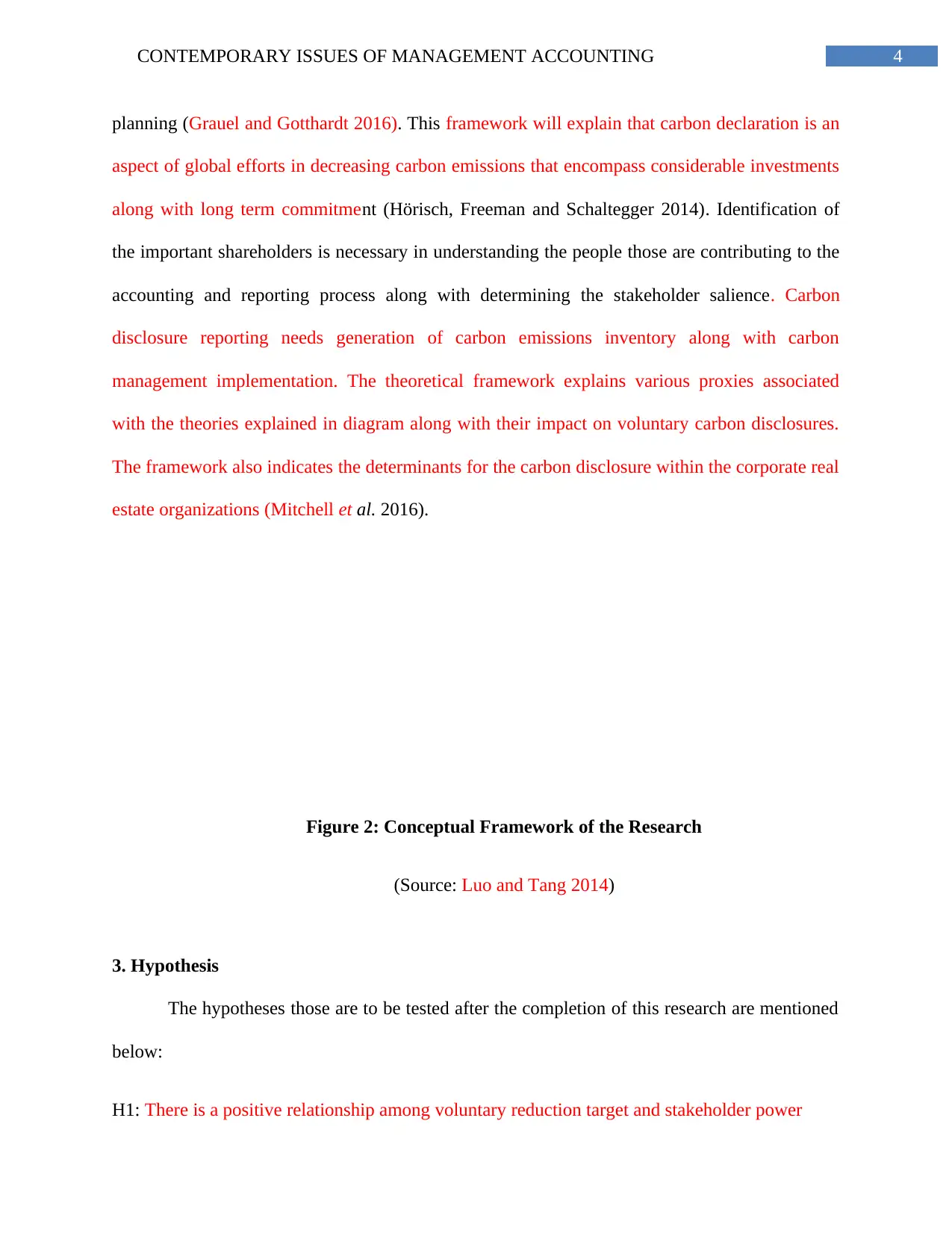
4CONTEMPORARY ISSUES OF MANAGEMENT ACCOUNTING
planning (Grauel and Gotthardt 2016). This framework will explain that carbon declaration is an
aspect of global efforts in decreasing carbon emissions that encompass considerable investments
along with long term commitment (Hörisch, Freeman and Schaltegger 2014). Identification of
the important shareholders is necessary in understanding the people those are contributing to the
accounting and reporting process along with determining the stakeholder salience. Carbon
disclosure reporting needs generation of carbon emissions inventory along with carbon
management implementation. The theoretical framework explains various proxies associated
with the theories explained in diagram along with their impact on voluntary carbon disclosures.
The framework also indicates the determinants for the carbon disclosure within the corporate real
estate organizations (Mitchell et al. 2016).
Figure 2: Conceptual Framework of the Research
(Source: Luo and Tang 2014)
3. Hypothesis
The hypotheses those are to be tested after the completion of this research are mentioned
below:
H1: There is a positive relationship among voluntary reduction target and stakeholder power
planning (Grauel and Gotthardt 2016). This framework will explain that carbon declaration is an
aspect of global efforts in decreasing carbon emissions that encompass considerable investments
along with long term commitment (Hörisch, Freeman and Schaltegger 2014). Identification of
the important shareholders is necessary in understanding the people those are contributing to the
accounting and reporting process along with determining the stakeholder salience. Carbon
disclosure reporting needs generation of carbon emissions inventory along with carbon
management implementation. The theoretical framework explains various proxies associated
with the theories explained in diagram along with their impact on voluntary carbon disclosures.
The framework also indicates the determinants for the carbon disclosure within the corporate real
estate organizations (Mitchell et al. 2016).
Figure 2: Conceptual Framework of the Research
(Source: Luo and Tang 2014)
3. Hypothesis
The hypotheses those are to be tested after the completion of this research are mentioned
below:
H1: There is a positive relationship among voluntary reduction target and stakeholder power
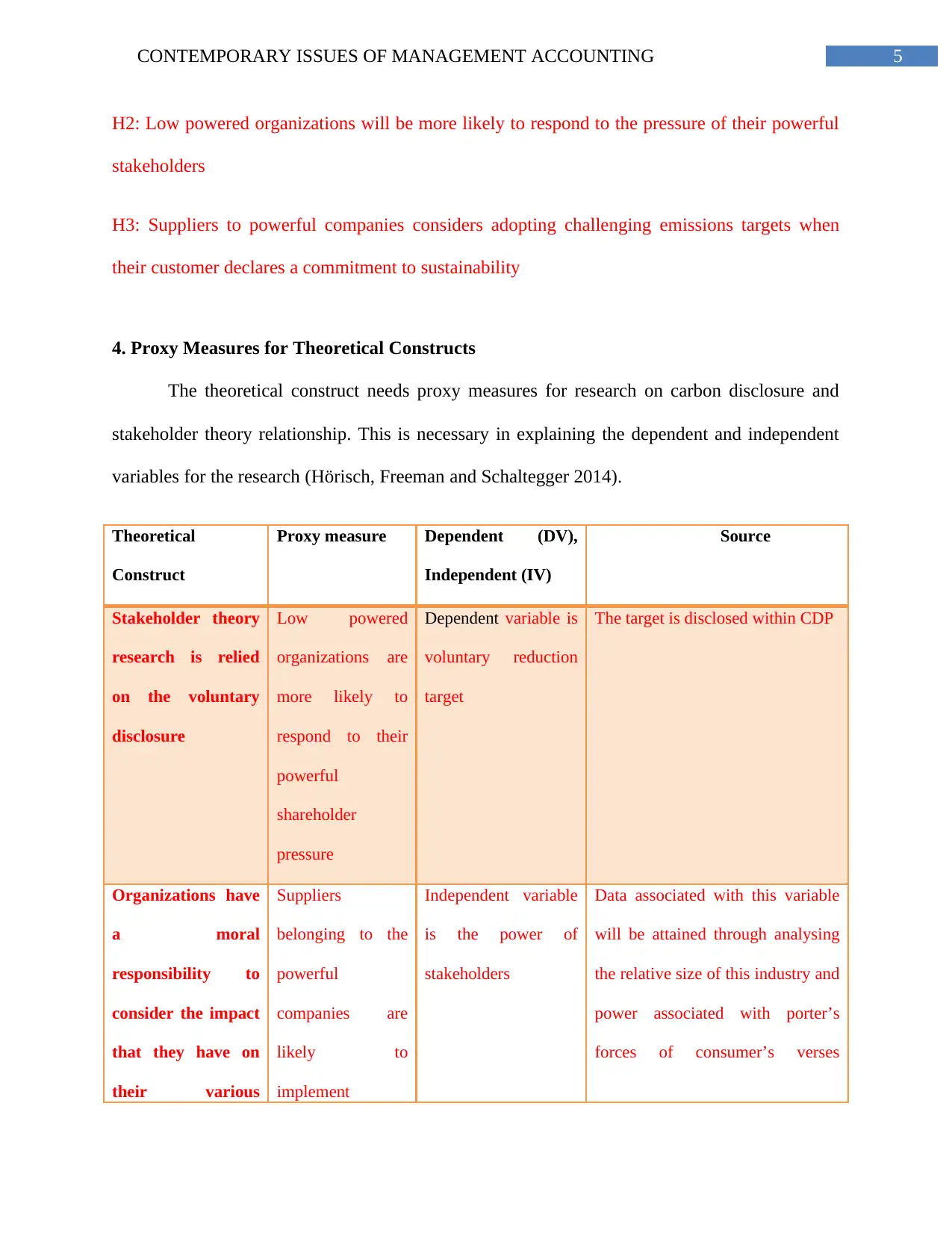
5CONTEMPORARY ISSUES OF MANAGEMENT ACCOUNTING
H2: Low powered organizations will be more likely to respond to the pressure of their powerful
stakeholders
H3: Suppliers to powerful companies considers adopting challenging emissions targets when
their customer declares a commitment to sustainability
4. Proxy Measures for Theoretical Constructs
The theoretical construct needs proxy measures for research on carbon disclosure and
stakeholder theory relationship. This is necessary in explaining the dependent and independent
variables for the research (Hörisch, Freeman and Schaltegger 2014).
Theoretical
Construct
Proxy measure Dependent (DV),
Independent (IV)
Source
Stakeholder theory
research is relied
on the voluntary
disclosure
Low powered
organizations are
more likely to
respond to their
powerful
shareholder
pressure
Dependent variable is
voluntary reduction
target
The target is disclosed within CDP
Organizations have
a moral
responsibility to
consider the impact
that they have on
their various
Suppliers
belonging to the
powerful
companies are
likely to
implement
Independent variable
is the power of
stakeholders
Data associated with this variable
will be attained through analysing
the relative size of this industry and
power associated with porter’s
forces of consumer’s verses
H2: Low powered organizations will be more likely to respond to the pressure of their powerful
stakeholders
H3: Suppliers to powerful companies considers adopting challenging emissions targets when
their customer declares a commitment to sustainability
4. Proxy Measures for Theoretical Constructs
The theoretical construct needs proxy measures for research on carbon disclosure and
stakeholder theory relationship. This is necessary in explaining the dependent and independent
variables for the research (Hörisch, Freeman and Schaltegger 2014).
Theoretical
Construct
Proxy measure Dependent (DV),
Independent (IV)
Source
Stakeholder theory
research is relied
on the voluntary
disclosure
Low powered
organizations are
more likely to
respond to their
powerful
shareholder
pressure
Dependent variable is
voluntary reduction
target
The target is disclosed within CDP
Organizations have
a moral
responsibility to
consider the impact
that they have on
their various
Suppliers
belonging to the
powerful
companies are
likely to
implement
Independent variable
is the power of
stakeholders
Data associated with this variable
will be attained through analysing
the relative size of this industry and
power associated with porter’s
forces of consumer’s verses
⊘ This is a preview!⊘
Do you want full access?
Subscribe today to unlock all pages.

Trusted by 1+ million students worldwide
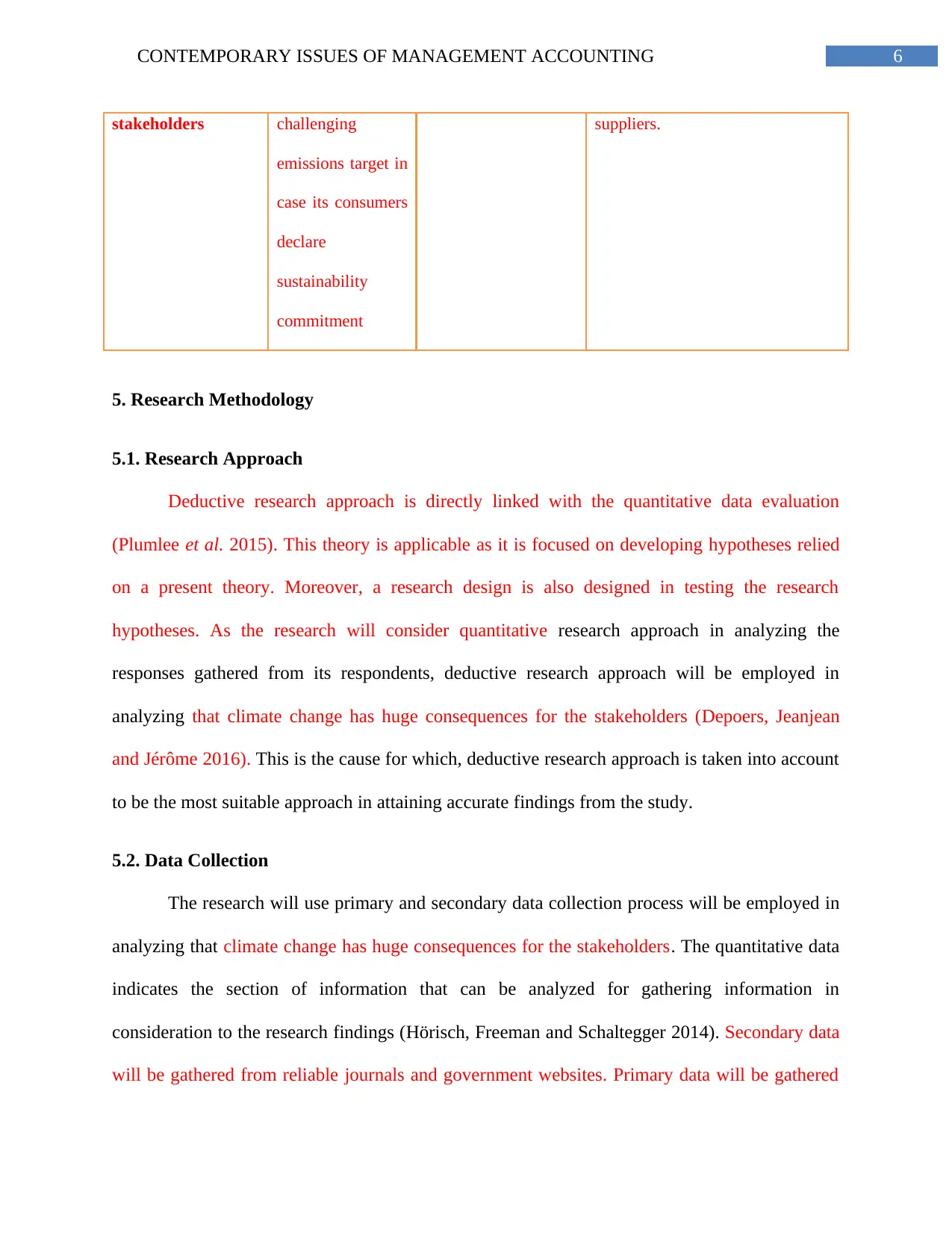
6CONTEMPORARY ISSUES OF MANAGEMENT ACCOUNTING
stakeholders challenging
emissions target in
case its consumers
declare
sustainability
commitment
suppliers.
5. Research Methodology
5.1. Research Approach
Deductive research approach is directly linked with the quantitative data evaluation
(Plumlee et al. 2015). This theory is applicable as it is focused on developing hypotheses relied
on a present theory. Moreover, a research design is also designed in testing the research
hypotheses. As the research will consider quantitative research approach in analyzing the
responses gathered from its respondents, deductive research approach will be employed in
analyzing that climate change has huge consequences for the stakeholders (Depoers, Jeanjean
and Jérôme 2016). This is the cause for which, deductive research approach is taken into account
to be the most suitable approach in attaining accurate findings from the study.
5.2. Data Collection
The research will use primary and secondary data collection process will be employed in
analyzing that climate change has huge consequences for the stakeholders. The quantitative data
indicates the section of information that can be analyzed for gathering information in
consideration to the research findings (Hörisch, Freeman and Schaltegger 2014). Secondary data
will be gathered from reliable journals and government websites. Primary data will be gathered
stakeholders challenging
emissions target in
case its consumers
declare
sustainability
commitment
suppliers.
5. Research Methodology
5.1. Research Approach
Deductive research approach is directly linked with the quantitative data evaluation
(Plumlee et al. 2015). This theory is applicable as it is focused on developing hypotheses relied
on a present theory. Moreover, a research design is also designed in testing the research
hypotheses. As the research will consider quantitative research approach in analyzing the
responses gathered from its respondents, deductive research approach will be employed in
analyzing that climate change has huge consequences for the stakeholders (Depoers, Jeanjean
and Jérôme 2016). This is the cause for which, deductive research approach is taken into account
to be the most suitable approach in attaining accurate findings from the study.
5.2. Data Collection
The research will use primary and secondary data collection process will be employed in
analyzing that climate change has huge consequences for the stakeholders. The quantitative data
indicates the section of information that can be analyzed for gathering information in
consideration to the research findings (Hörisch, Freeman and Schaltegger 2014). Secondary data
will be gathered from reliable journals and government websites. Primary data will be gathered
Paraphrase This Document
Need a fresh take? Get an instant paraphrase of this document with our AI Paraphraser
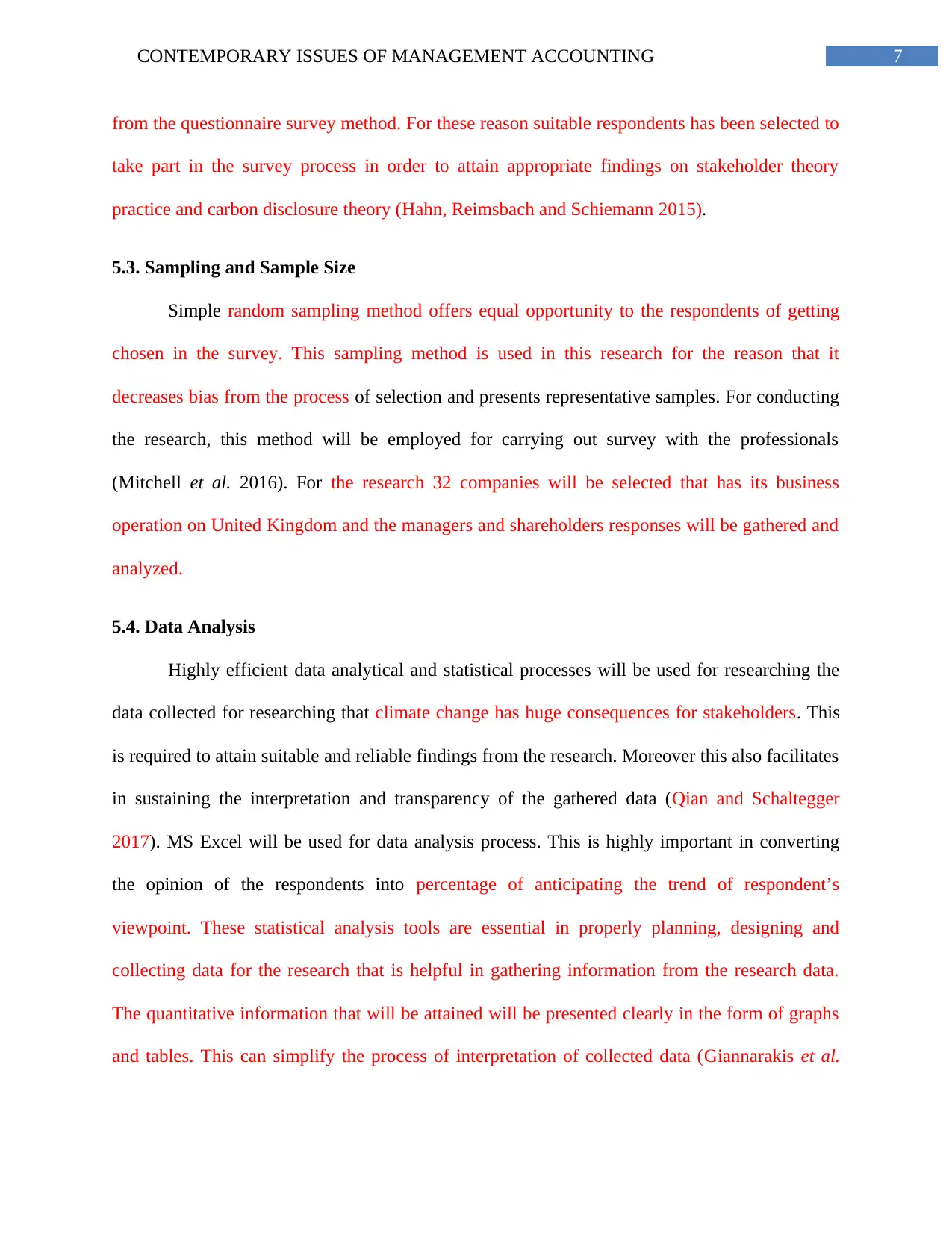
7CONTEMPORARY ISSUES OF MANAGEMENT ACCOUNTING
from the questionnaire survey method. For these reason suitable respondents has been selected to
take part in the survey process in order to attain appropriate findings on stakeholder theory
practice and carbon disclosure theory (Hahn, Reimsbach and Schiemann 2015).
5.3. Sampling and Sample Size
Simple random sampling method offers equal opportunity to the respondents of getting
chosen in the survey. This sampling method is used in this research for the reason that it
decreases bias from the process of selection and presents representative samples. For conducting
the research, this method will be employed for carrying out survey with the professionals
(Mitchell et al. 2016). For the research 32 companies will be selected that has its business
operation on United Kingdom and the managers and shareholders responses will be gathered and
analyzed.
5.4. Data Analysis
Highly efficient data analytical and statistical processes will be used for researching the
data collected for researching that climate change has huge consequences for stakeholders. This
is required to attain suitable and reliable findings from the research. Moreover this also facilitates
in sustaining the interpretation and transparency of the gathered data (Qian and Schaltegger
2017). MS Excel will be used for data analysis process. This is highly important in converting
the opinion of the respondents into percentage of anticipating the trend of respondent’s
viewpoint. These statistical analysis tools are essential in properly planning, designing and
collecting data for the research that is helpful in gathering information from the research data.
The quantitative information that will be attained will be presented clearly in the form of graphs
and tables. This can simplify the process of interpretation of collected data (Giannarakis et al.
from the questionnaire survey method. For these reason suitable respondents has been selected to
take part in the survey process in order to attain appropriate findings on stakeholder theory
practice and carbon disclosure theory (Hahn, Reimsbach and Schiemann 2015).
5.3. Sampling and Sample Size
Simple random sampling method offers equal opportunity to the respondents of getting
chosen in the survey. This sampling method is used in this research for the reason that it
decreases bias from the process of selection and presents representative samples. For conducting
the research, this method will be employed for carrying out survey with the professionals
(Mitchell et al. 2016). For the research 32 companies will be selected that has its business
operation on United Kingdom and the managers and shareholders responses will be gathered and
analyzed.
5.4. Data Analysis
Highly efficient data analytical and statistical processes will be used for researching the
data collected for researching that climate change has huge consequences for stakeholders. This
is required to attain suitable and reliable findings from the research. Moreover this also facilitates
in sustaining the interpretation and transparency of the gathered data (Qian and Schaltegger
2017). MS Excel will be used for data analysis process. This is highly important in converting
the opinion of the respondents into percentage of anticipating the trend of respondent’s
viewpoint. These statistical analysis tools are essential in properly planning, designing and
collecting data for the research that is helpful in gathering information from the research data.
The quantitative information that will be attained will be presented clearly in the form of graphs
and tables. This can simplify the process of interpretation of collected data (Giannarakis et al.
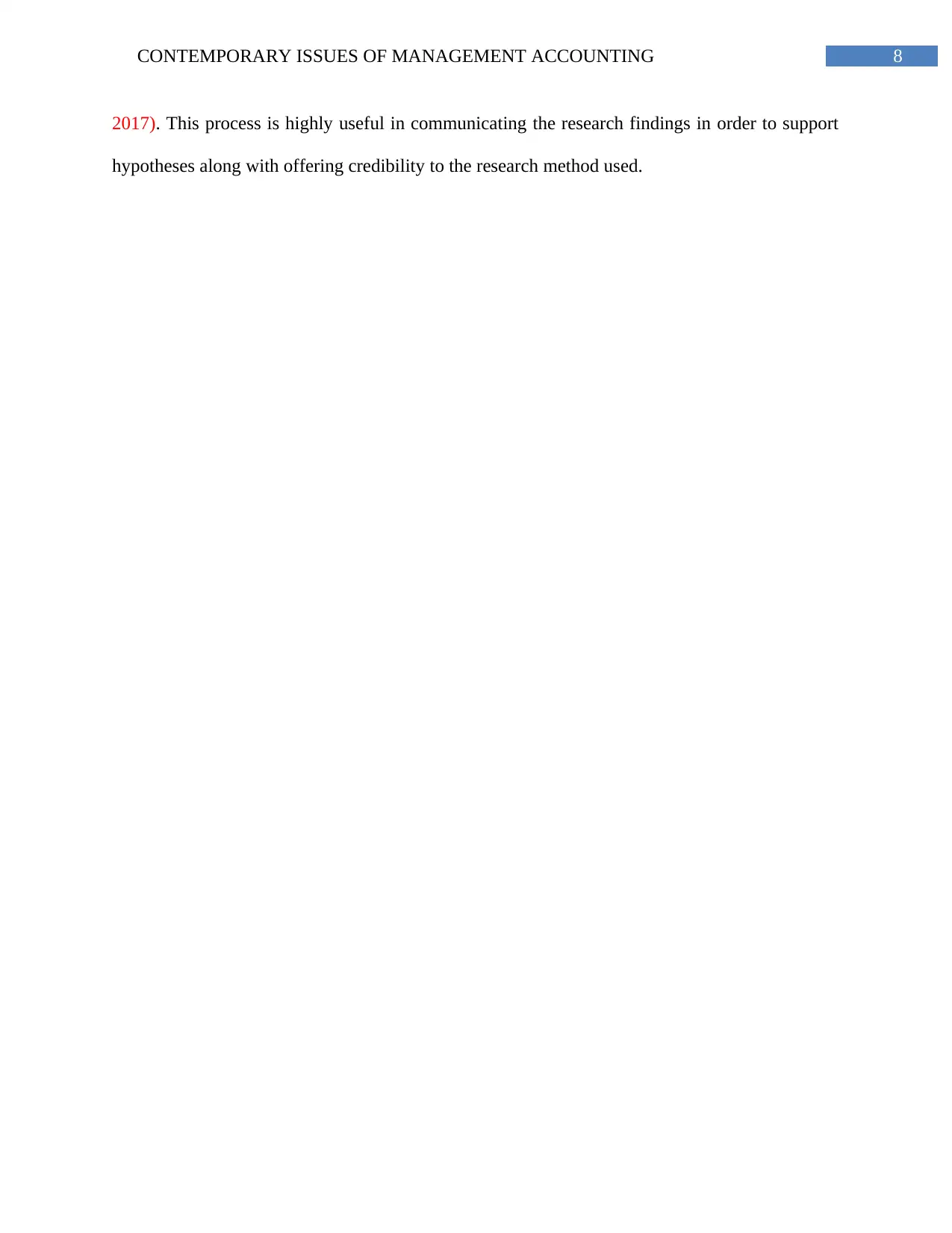
8CONTEMPORARY ISSUES OF MANAGEMENT ACCOUNTING
2017). This process is highly useful in communicating the research findings in order to support
hypotheses along with offering credibility to the research method used.
2017). This process is highly useful in communicating the research findings in order to support
hypotheses along with offering credibility to the research method used.
⊘ This is a preview!⊘
Do you want full access?
Subscribe today to unlock all pages.

Trusted by 1+ million students worldwide
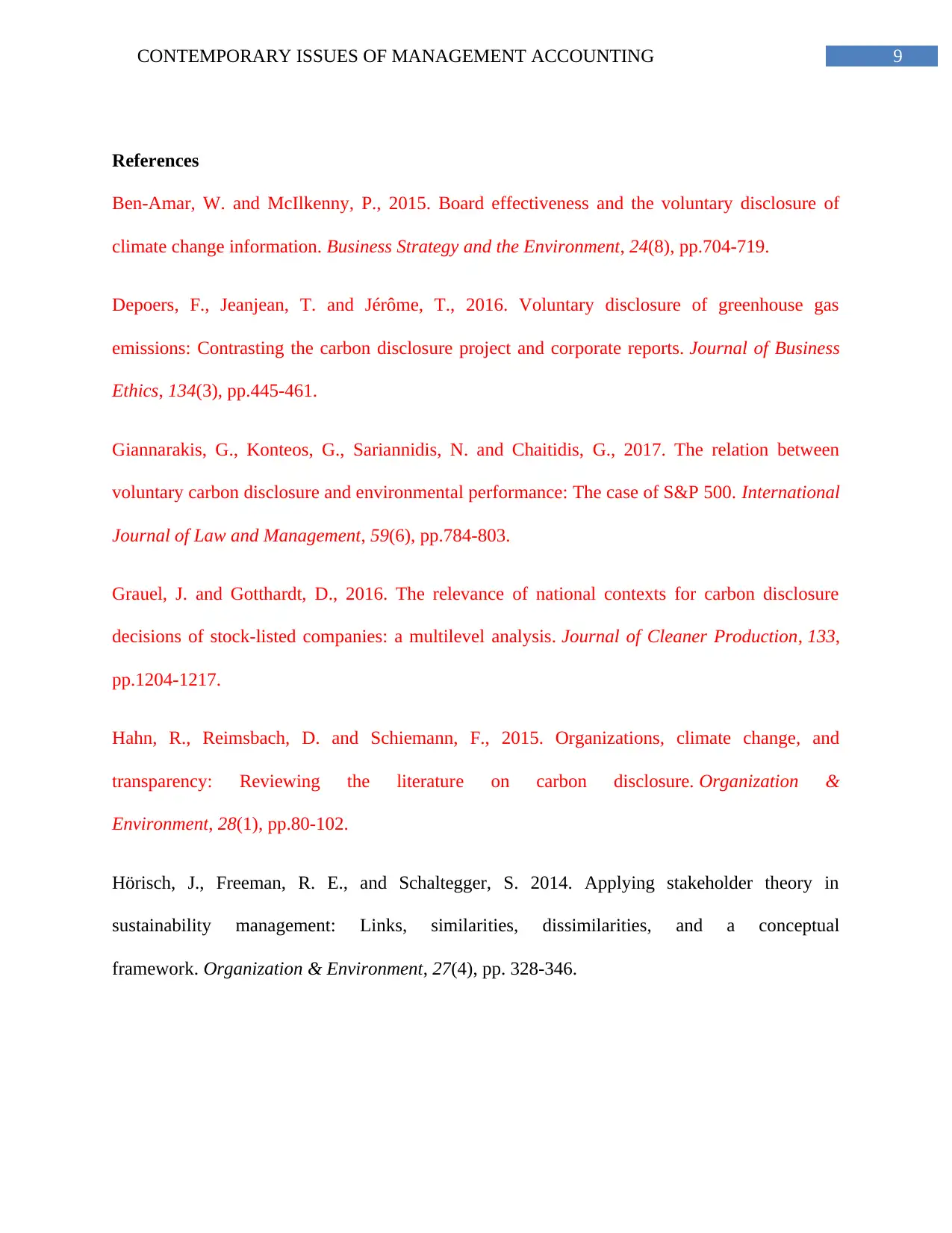
9CONTEMPORARY ISSUES OF MANAGEMENT ACCOUNTING
References
Ben‐Amar, W. and McIlkenny, P., 2015. Board effectiveness and the voluntary disclosure of
climate change information. Business Strategy and the Environment, 24(8), pp.704-719.
Depoers, F., Jeanjean, T. and Jérôme, T., 2016. Voluntary disclosure of greenhouse gas
emissions: Contrasting the carbon disclosure project and corporate reports. Journal of Business
Ethics, 134(3), pp.445-461.
Giannarakis, G., Konteos, G., Sariannidis, N. and Chaitidis, G., 2017. The relation between
voluntary carbon disclosure and environmental performance: The case of S&P 500. International
Journal of Law and Management, 59(6), pp.784-803.
Grauel, J. and Gotthardt, D., 2016. The relevance of national contexts for carbon disclosure
decisions of stock-listed companies: a multilevel analysis. Journal of Cleaner Production, 133,
pp.1204-1217.
Hahn, R., Reimsbach, D. and Schiemann, F., 2015. Organizations, climate change, and
transparency: Reviewing the literature on carbon disclosure. Organization &
Environment, 28(1), pp.80-102.
Hörisch, J., Freeman, R. E., and Schaltegger, S. 2014. Applying stakeholder theory in
sustainability management: Links, similarities, dissimilarities, and a conceptual
framework. Organization & Environment, 27(4), pp. 328-346.
References
Ben‐Amar, W. and McIlkenny, P., 2015. Board effectiveness and the voluntary disclosure of
climate change information. Business Strategy and the Environment, 24(8), pp.704-719.
Depoers, F., Jeanjean, T. and Jérôme, T., 2016. Voluntary disclosure of greenhouse gas
emissions: Contrasting the carbon disclosure project and corporate reports. Journal of Business
Ethics, 134(3), pp.445-461.
Giannarakis, G., Konteos, G., Sariannidis, N. and Chaitidis, G., 2017. The relation between
voluntary carbon disclosure and environmental performance: The case of S&P 500. International
Journal of Law and Management, 59(6), pp.784-803.
Grauel, J. and Gotthardt, D., 2016. The relevance of national contexts for carbon disclosure
decisions of stock-listed companies: a multilevel analysis. Journal of Cleaner Production, 133,
pp.1204-1217.
Hahn, R., Reimsbach, D. and Schiemann, F., 2015. Organizations, climate change, and
transparency: Reviewing the literature on carbon disclosure. Organization &
Environment, 28(1), pp.80-102.
Hörisch, J., Freeman, R. E., and Schaltegger, S. 2014. Applying stakeholder theory in
sustainability management: Links, similarities, dissimilarities, and a conceptual
framework. Organization & Environment, 27(4), pp. 328-346.
Paraphrase This Document
Need a fresh take? Get an instant paraphrase of this document with our AI Paraphraser
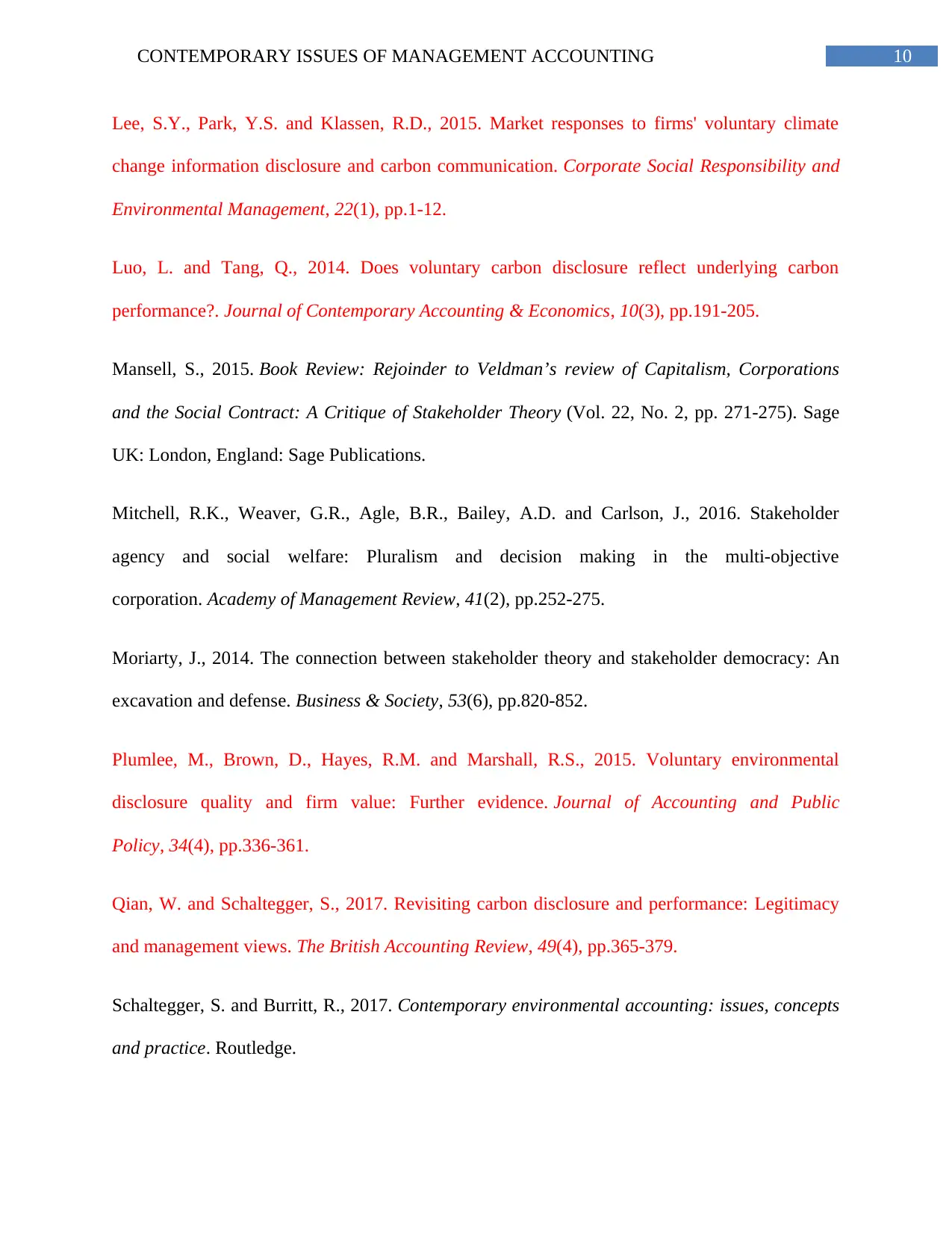
10CONTEMPORARY ISSUES OF MANAGEMENT ACCOUNTING
Lee, S.Y., Park, Y.S. and Klassen, R.D., 2015. Market responses to firms' voluntary climate
change information disclosure and carbon communication. Corporate Social Responsibility and
Environmental Management, 22(1), pp.1-12.
Luo, L. and Tang, Q., 2014. Does voluntary carbon disclosure reflect underlying carbon
performance?. Journal of Contemporary Accounting & Economics, 10(3), pp.191-205.
Mansell, S., 2015. Book Review: Rejoinder to Veldman’s review of Capitalism, Corporations
and the Social Contract: A Critique of Stakeholder Theory (Vol. 22, No. 2, pp. 271-275). Sage
UK: London, England: Sage Publications.
Mitchell, R.K., Weaver, G.R., Agle, B.R., Bailey, A.D. and Carlson, J., 2016. Stakeholder
agency and social welfare: Pluralism and decision making in the multi-objective
corporation. Academy of Management Review, 41(2), pp.252-275.
Moriarty, J., 2014. The connection between stakeholder theory and stakeholder democracy: An
excavation and defense. Business & Society, 53(6), pp.820-852.
Plumlee, M., Brown, D., Hayes, R.M. and Marshall, R.S., 2015. Voluntary environmental
disclosure quality and firm value: Further evidence. Journal of Accounting and Public
Policy, 34(4), pp.336-361.
Qian, W. and Schaltegger, S., 2017. Revisiting carbon disclosure and performance: Legitimacy
and management views. The British Accounting Review, 49(4), pp.365-379.
Schaltegger, S. and Burritt, R., 2017. Contemporary environmental accounting: issues, concepts
and practice. Routledge.
Lee, S.Y., Park, Y.S. and Klassen, R.D., 2015. Market responses to firms' voluntary climate
change information disclosure and carbon communication. Corporate Social Responsibility and
Environmental Management, 22(1), pp.1-12.
Luo, L. and Tang, Q., 2014. Does voluntary carbon disclosure reflect underlying carbon
performance?. Journal of Contemporary Accounting & Economics, 10(3), pp.191-205.
Mansell, S., 2015. Book Review: Rejoinder to Veldman’s review of Capitalism, Corporations
and the Social Contract: A Critique of Stakeholder Theory (Vol. 22, No. 2, pp. 271-275). Sage
UK: London, England: Sage Publications.
Mitchell, R.K., Weaver, G.R., Agle, B.R., Bailey, A.D. and Carlson, J., 2016. Stakeholder
agency and social welfare: Pluralism and decision making in the multi-objective
corporation. Academy of Management Review, 41(2), pp.252-275.
Moriarty, J., 2014. The connection between stakeholder theory and stakeholder democracy: An
excavation and defense. Business & Society, 53(6), pp.820-852.
Plumlee, M., Brown, D., Hayes, R.M. and Marshall, R.S., 2015. Voluntary environmental
disclosure quality and firm value: Further evidence. Journal of Accounting and Public
Policy, 34(4), pp.336-361.
Qian, W. and Schaltegger, S., 2017. Revisiting carbon disclosure and performance: Legitimacy
and management views. The British Accounting Review, 49(4), pp.365-379.
Schaltegger, S. and Burritt, R., 2017. Contemporary environmental accounting: issues, concepts
and practice. Routledge.
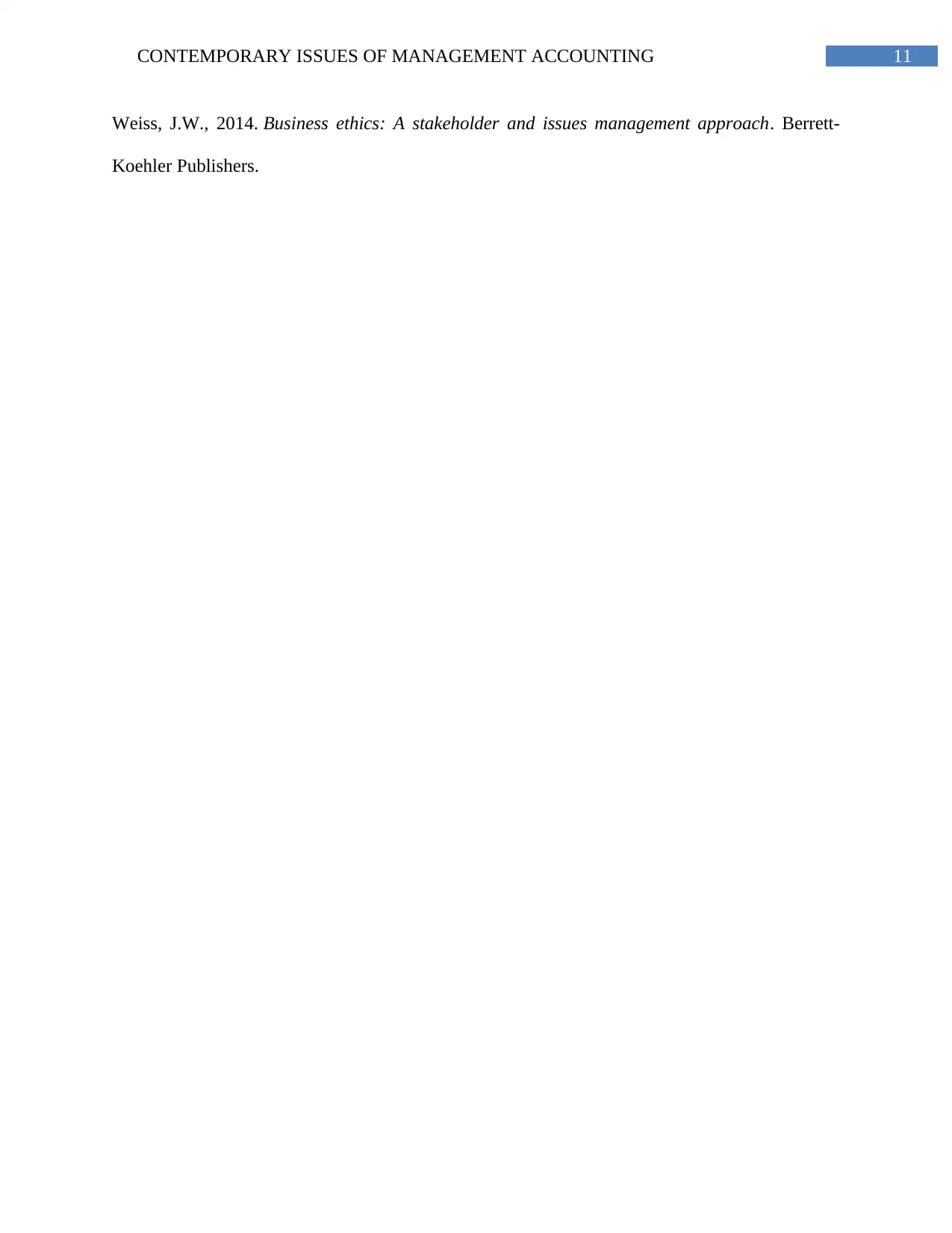
11CONTEMPORARY ISSUES OF MANAGEMENT ACCOUNTING
Weiss, J.W., 2014. Business ethics: A stakeholder and issues management approach. Berrett-
Koehler Publishers.
Weiss, J.W., 2014. Business ethics: A stakeholder and issues management approach. Berrett-
Koehler Publishers.
⊘ This is a preview!⊘
Do you want full access?
Subscribe today to unlock all pages.

Trusted by 1+ million students worldwide
1 out of 12
Related Documents
Your All-in-One AI-Powered Toolkit for Academic Success.
+13062052269
info@desklib.com
Available 24*7 on WhatsApp / Email
![[object Object]](/_next/static/media/star-bottom.7253800d.svg)
Unlock your academic potential
Copyright © 2020–2026 A2Z Services. All Rights Reserved. Developed and managed by ZUCOL.





